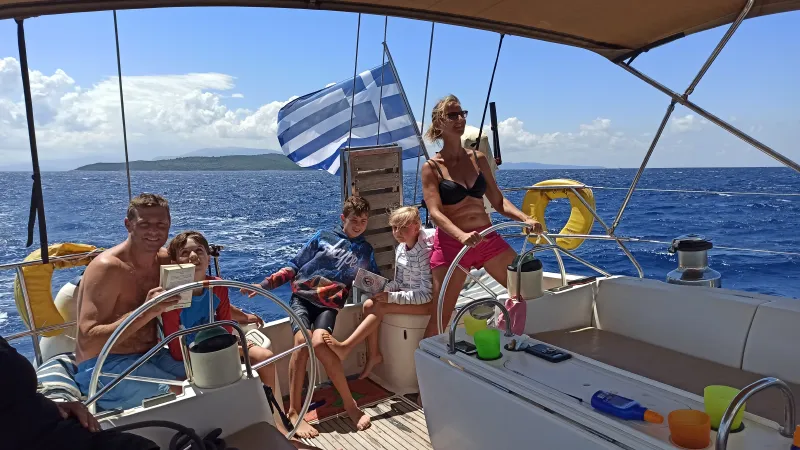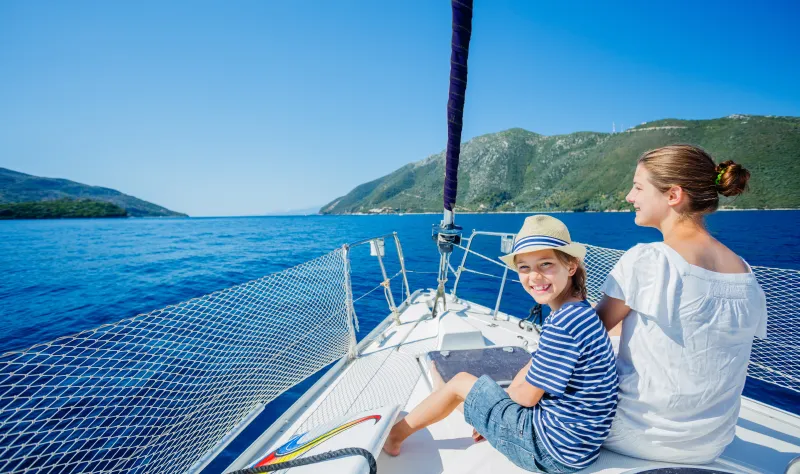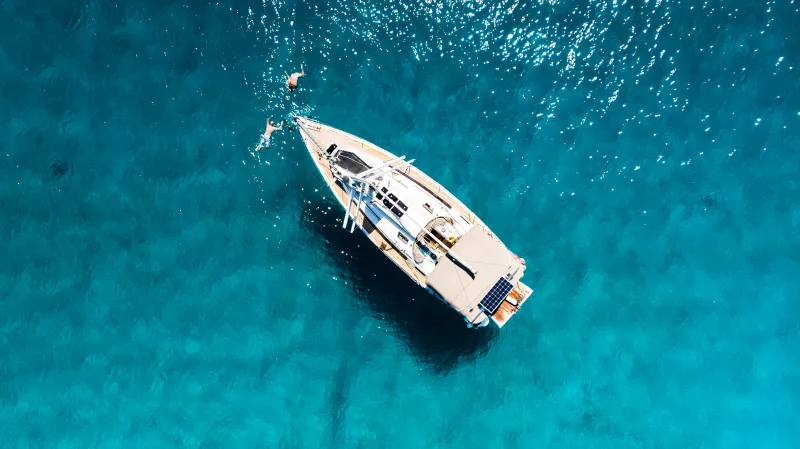Top Tips for Family Sailing
Our MD, Chris Lorenzo talks through some of the aspects to making an amazing family sailing holiday
If you are already a family of sailors you will already know how sailing brings you together, as a fun, active, often exciting sport or hobby, with a cross-generational appeal. As a family holiday, it is also arguably one of the very best ways of discovering and exploring new destinations as well as enjoying things like swimming and snorkeling, paddle boarding to say nothing about sightseeing and exploring ashore. This is of course all additional to simply experiencing the joy of sailing on a well-appointed and equipped yacht in the most idyllic of locations.
It’s no accident that sailing trips are often promoted as the ideal team-building exercise by businesses and also sports teams of all kinds. However sailing as a family can have its pitfalls, so here are some tips from us to help you avoid them.

Involve the Whole Crew in the Booking
The classic example is where one parent is a keen sailor, but the rest of the family are reluctant partners, ‘press-ganged’ into doing something they are unsure about. The first tip is to try to get them on side from the planning stage. Get them involved in the process of deciding where and when to go, and on what type of yacht.
If some members of the family are complete beginners, this choice needs particular care, a challenging destination that will scare them is likely to put them off sailing forever, so somewhere with moderate conditions like the Ionian in Greece could be the ideal choice. In contrast, if members of the family sail regularly in the UK, perhaps racing at your local club, then somewhere with some wind like the Dodecanese is probably your ideal choice to keep them interested.

Safety Considerations
Safety is always important when sailing a yacht, especially while sailing with children, and with the right outlook this can be achieved very easily. Proper briefings are always important before any new manoeuver and making time for this advance will make anything safer and easier. Lifejackets are another consideration, one that is up to the skipper but with children onboard many parents insist on wearing these a lot more often. For younger children safety netting is very key, and all bases can add this, along with setting simple rules like staying in the cockpit unless supervised. Finally having a second crew member onboard briefed and comfortable with the yacht’s safety systems, often the second parent or an older child is desirable, and this person having a RYA Competent Crew can also be useful.
Preparing for Sea
It is good practice to do a crew briefing before setting off, so they not only know what’s happening and what to expect, but are also given a role, whether this is being in charge of the main or jib sheets during tacks and gybes, perhaps doing a stint at the helm, plus a multitude of other tasks like handling the electric windlass, the dinghy and outboard, mooring lines and fenders and so on. Asking for volunteers for specific tasks is arguably the best approach here.

Put Away phones & Tablets
We all know how games and social media have become an obsession with youngsters (and a few grown ups…) and if one is going to spend their holiday glued to their screens, it sort of defeats the object. Reaching an understanding with everyone on board that all phones and tablets go into a dry bag or plastic box for the duration of each day’s sailing can completely transform the experience. Suddenly, they become aware and involved. Whether it is getting an extra knot of speed through tweaking the sails, being on dolphin/turtle watch, identifying points of interest ashore with binoculars, swinging around on a halyard in the bosun’s chair, or simply using their imagination in games and play can be transformational.

Patience is a Virtue
Most parents have probably been guilty of losing patience with their children, but at sea on holiday is the last place you should do so. If you had sent your child on a sailing course, and subsequently discovered that the instructor had been shouting at them when they made a mistake or misunderstood an instruction, you would no doubt be very unhappy about that. The only time you can justify shouting is in an emergency where you need their immediate attention for their safety, or where the wind is so loud that they could not otherwise hear you..
Shouting due to impatience or anger is a surefire way of alienating a crew member and losing their cooperation. Explain what you want them to do, make sure they have understood and get them to practice what you have shown them, whether this is how to throw a mooring line, tie on a fender or safely use a sheet winch.
Fair Distribuition
It’s important to include everyone on board, but also to distribute tasks and responsibilities fairly. For example giving everyone a go on the helm as well as doing the dishes. If on the other had a crew member really doesn’t want to do something, it is probably best to just accept that and let them be. After all, the holiday is as important to them as it is to you and not everyone is a future Ben Ainsley or Dame Ellen McArthur.

Feed Childrens Imagination
A big part of the wonder of sailing to children is how it feeds the imagination. Pirates discovering a hidden cove or swimming with mermaids are just two examples of memories that children will have long after their sailing holiday. To aid this bring along a few bits of fancy dress, perfect to get everyone in the mood for adventures.
Don't Sail too much each day
While its of course possible to sail a huge distance each day, this isn’t necessarily the best idea for families who are new to sailing. Long distances without a stop can lose the excitement for children and can instead lead to boredom. There is no set length but a short sail followed by a lunch/swim stop then more sailing is a great way to enjoy the day, if you are on flotilla the lead crew will be able to show you the best places. All our flotillas have an average distance per day which indicates how far you need to travel each day although your free to take a longer route and explore as much as you want.
Get out early and enjoy the day
It can be tempting to relax in a harbour in the morning and not head out until lunchtime but those who make the most of their sailing holidays tend to get out a little earlier. Aiming to cast off by 10am is a great way to make the most of the day, explore the best coves, snorkel with the best fish and have had a great sail while not having to rush to get to the next harbour.

What is a good age for Children to start sailing
Determining the appropriate age for children to embark on a sailing holiday is a decision left to the discretion of parents. In my case, I introduced my son to the delights of yachting when he was just 9 months old! For toddlers and infants, it’s advisable to secure child safety netting, readily accessible at all bases, to prevent them from maneuvering through gaps in the railings and it is recommended they are continuously supervised. Buoyancy aids and foam life jackets are widely favored for ensuring the safety of younger children while sailing. As kids reach approximately 7 years of age, they can actively participate in the sailing process, making the entire experience well within their reach.

Flotilla for sailing in Company
A flotilla holiday can be the perfect choice for families. Apart from the comfort of having the great local knowledge and support of the lead crew, which can eliminate some of the stresses and uncertainties from the trip, During school holidays, you can be sure that there will be other families on the flotilla, whilst the lead crew will organise some activities specifically for children. Often enduring new friendships can be made, and there is generally a friendly and fun vibe to the flotilla.
Skippered Charters & Yacht Training
Another alternative to consider for beginners or the less experienced is a skippered charter, where we can provide an experienced English speaking skipper or even a training week with a qualified RYA instructor on board running a sailing course exclusively for your party. It is notable here that an instructor can handle mixed ability groups for example a Start Yachting or Competent Crew course combined with a Day Skipper course. This can also be combined with a flotilla to add the social dimension to the holiday.

Book Early & Save
January and February are key booking months for the school holiday period, so if a family sailing trip floats your boat this summer, the recommendation is to get in early so that you can secure your first choice of destination and yacht. Another important tip is that booking as early as possible ensures you secure cheaper flights, since as we have all learned the hard way, as you get closer to the departure dates flight prices will only go up! We also have great value special offers such as a Free SUP for early bookers.
So there you have it, and if you need more advice on the most suitable destination or what yacht type to choose, feel free to call and speak to one of our team. They are all experienced so you can be sure of sound advice. In the meantime here as some links to help you check out what’s on offer.





